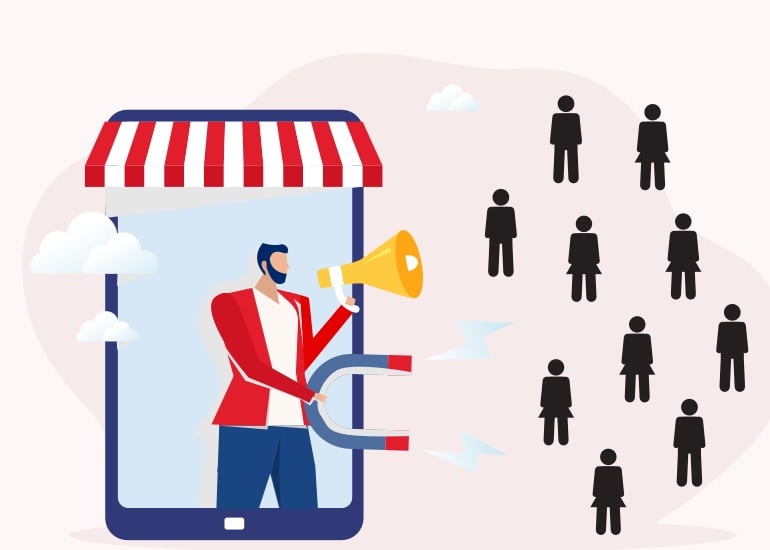If your goal is to use social media to support your business goals, simply creating a profile and sharing updates is not enough.
You need to be actively building relationships and interacting with potential customers regularly.
In this article, we will explore four critical principles of effective B2B social selling so that you can start generating leads and closing deals through your social media interactions.
What is Social Selling and Why Is It Important?
It may sound basic, but you wouldn’t believe how many people come to us having tried their hand at “social selling” without actually identifying a list of people that they want to sell to. That’s the first thing that any social seller should do!
But, you can’t just make a list of prospects and expect magic to happen. You have to purposefully engage with them as well. This includes both more overt communications like responding to their posts and joining conversations they participate in and less over micro-engagements such as liking their content or engaging with people in their peripheral. When your prospects see you adding value and engaging with people throughout their industry, you do a lot to establish yourself as a person to pay attention to.

Social selling uses social media to build relationships and interact with potential customers. It’s an effective way to connect with more prospects, nurture leads, and close deals.
Most buyers are already active on social media, so it’s a great place to reach them. And since social selling doesn’t require hard selling, it’s more likely to result in a positive experience for the buyer.
Social selling is important because it helps you:
1. Find and Connect with More Prospects
This means you can reach a larger audience and connect with potential customers to whom you wouldn’t have otherwise had access.
2. Nurture Leads
You can build relationships with potential customers by providing valuable content and engaging in two-way conversations. This helps move prospects through the sales funnel faster.
3. Close Deals Faster
Since social selling is about building relationships, it can help you close deals faster. When buyers trust and like you, they’re more likely to do business with you.
4. Increase Brand Awareness and Reputation
Social selling helps you reach more people and build relationships with potential customers. When you do this, you’ll also be building your brand’s reputation.
These days, buyers are more informed than ever before. They’re doing their research and often don’t need or want to talk to a salesperson until they’re ready to buy.
The Key Takeaway
Social selling allows you to build relationships with buyers long before they’re ready to make a purchase. By providing valuable content and resources, you can position yourself as a trusted advisor and help them through the buyer’s journey.
When done correctly, social selling can be an effective way to increase sales and grow your business. But there’s a right and wrong way to go about it.
4 Critical Principles of Effective B2B Social Selling
If you want to use social selling to support your business goals, you need to follow a few critical principles of social selling in digital marketing:
Principle 1: Social Selling Starts with Listening
The first step to social selling is listening. You need to find out where your potential customers or target audience/demographic hang out online and what they’re talking about. Only then can you join the conversation and add value.
You can use social media listening tools like Hootsuite Insights or Mention. These tools will help you track mentions of your brand, competitor brands, and relevant keywords. You can also set up Google Alerts to get notified whenever someone mentions your brand or a keyword on the web.

Once you’ve found out where your potential customers are talking, it’s time to start listening. Read their posts and comments, and get a feel for the issues they’re facing. What are their pain points? What do they need help with?
You can also use social media monitoring tools to track sentiment around your brand. This will give you an idea of how people feel about you and your product. Are they mostly positive or negative? What are the most common complaints?
Principle 2: Social Selling Is About Adding Value
The next principle of social selling is about adding value. This means going beyond listening and engaging with potential customers. Offer them advice, share helpful resources, and answer their questions.
The goal is to build relationships and be seen as a trusted advisor. This way, they'll think of you when they’re ready to buy.
To add value, you need to be active on social media. This means posting regularly, commenting on other people’s posts, and participating in discussions.
It’s also important to ensure that your content is relevant and helpful. No one wants to be bombarded with sales pitches, so focus on providing value instead.
Principles 3: Social Selling Requires Patience
The third principle of social selling is that it requires patience. It takes time to build relationships and trust, so don’t expect immediate results.
The key is to be consistent with your engagement. If you only interact with potential customers occasionally, they will not remember you when they’re ready to buy.

You also need to be prepared for the occasional negative comment or review. This is inevitable, so don’t take it personally. Instead, use it as an opportunity to show that you care about your customers and are willing to listen to feedback.
Principle 4: Social Selling Is a Team Effort
The fourth and final principle of social selling is that it’s a team effort. Everyone in your company needs to be on board with building relationships with potential customers.
This means having a social media policy outlining what’s acceptable and not. It also means training your employees to engage with potential customers in a helpful way, not sales.
If you want to be successful at social selling, you need to ensure everyone in your company is on the same page.
Social Selling Plays an Important Role in the Sales Process
Social selling should be integrated into your overall sales process. It’s not a replacement for traditional selling, but it is a valuable tool that can help you close more deals.
Here’s how social selling fits into the sales process:
-
Awareness: Use social media marketing to generate leads and increase brand awareness.
-
Engagement: Connect with potential customers on social media and start building relationships.
-
Research: Use social media to research potential customers and learn more about their needs.
-
Closing: Use social media to close deals by providing relevant information and answers to questions.
Social Selling Is Most Effective When It’s Personalized

The key to social selling is personalization. You need to treat each potential customer individually and tailor your interactions accordingly.
Here are a few ways you can personalize your social selling approach:
a) Get to know the person behind the profile: Take the time to learn about the person you’re talking to. Look at their profile, check out their website, and see what they’re interested in.
b) Make it about them: The focus of your interactions should be on the other person, not you. Ask questions, show interest in their business, and avoid talking about yourself too much. Be genuine in your interactions, and don’t try to sell too hard. People can see right through someone trying to make a quick sale.
c) Tailor your message: Create custom messages for each potential customer based on what you know about them.
d) Make it personal: Besides tailoring your message, ensure your interactions are personal. Use the person’s name, mention something you have in common, and avoid generic messages.
e) Show that you care: The best way to build rapport is by showing that you care about the other person and their business. Be genuine in your interest and concern, and take the time to offer help and advice.
The Bottom Line
Social selling is a powerful way to build relationships with potential customers and close more deals. Following the four principles outlined above can set your business up for success.
But social selling strategy is just one piece of the puzzle. To maximize your results, you need to have a comprehensive sales strategy that includes other elements like lead generation, lead nurturing, and sales enablement.
If you’re not sure where to start, we can help. Our sales experts can develop a customized sales strategy tailored to your business needs. Contact us today to learn more.









